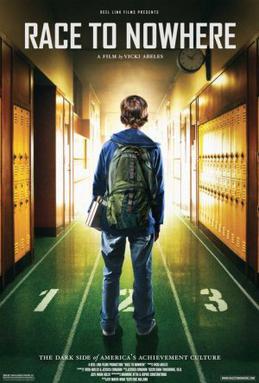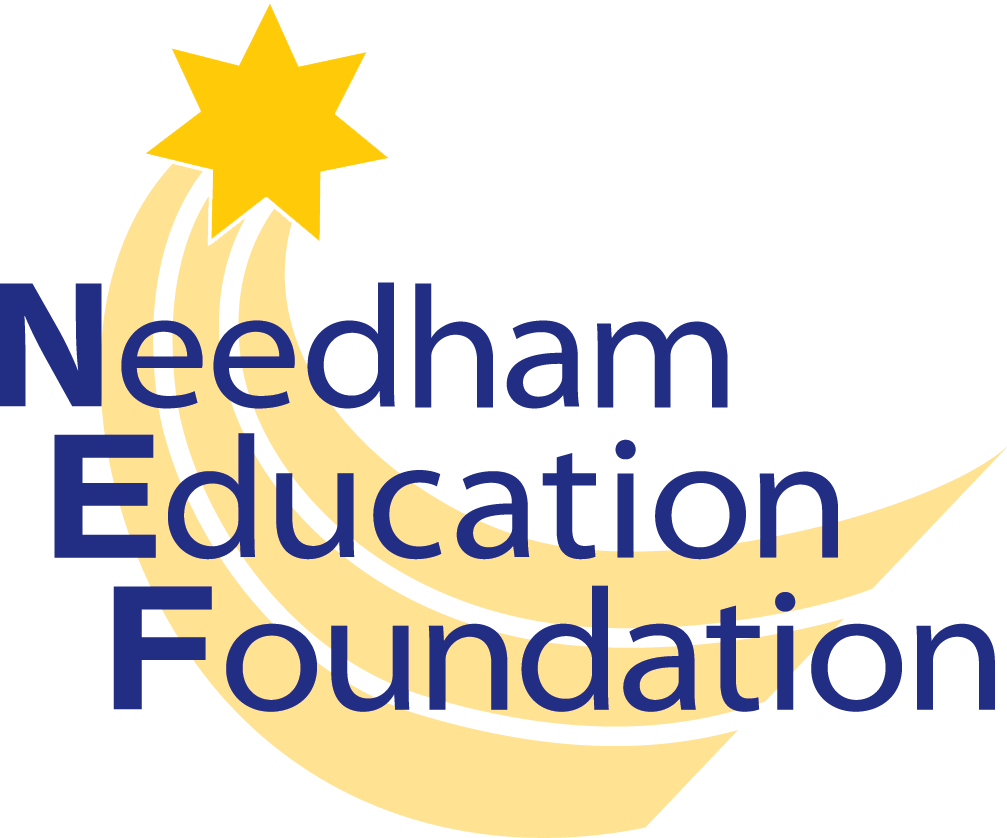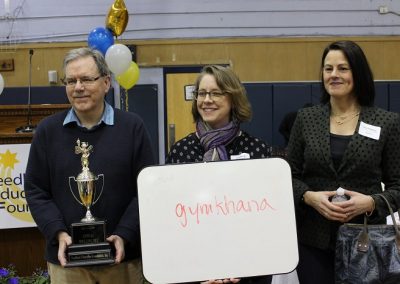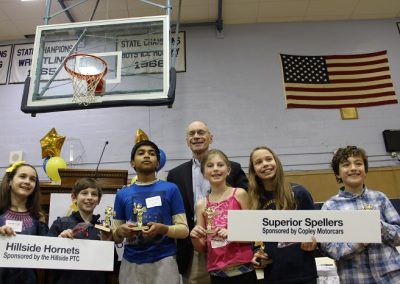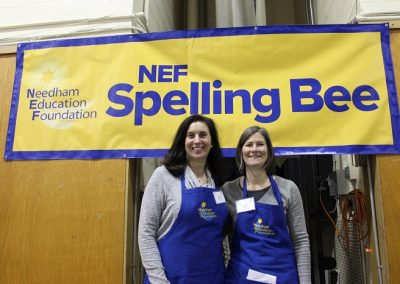NEF Wins Massachusetts School Library Association Award
We are honored that the NEF is this year’s recipient of the Massachusetts School Library Association PALS (Parents as Library Supporters) Award. This award honors any parent/teacher group working within a school or district, including PTAs, PTOs, or other parent/teacher groups who have had a significant impact on the school library and library programs in the district.
Thanks to Needham High School Librarian Paige Rowse for nominating the NEF — as well as writing so many terrific grant proposals that have brought authors and enriching materials to Needham High School.
The NEF Co-President, Sarah Winig, attended the Awards Banquet on March 25th at the DCU Center in Worcester to accept the award on behalf of the NEF.
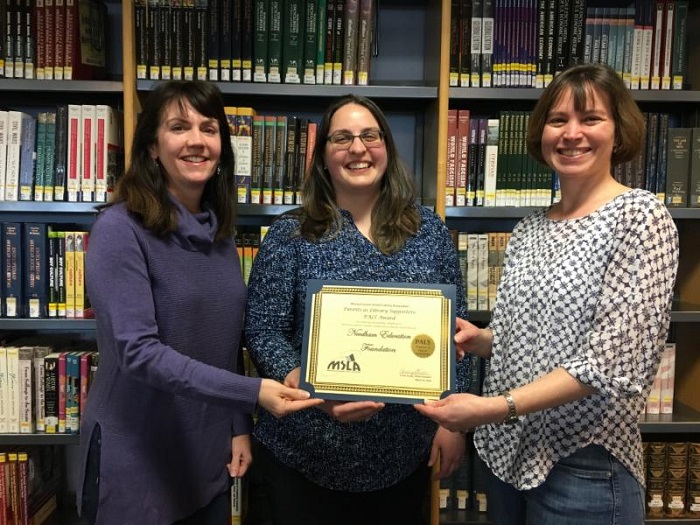
2018 Spelling Bee
The Olin College Phoenixes Win the Bee and Elementary Round Ends in a Tie!
This past Sunday, the Needham community came together to test their spelling prowess at the 27th Annual NEF Spelling Bee. Nearly 40 teams participated, including elementary, middle and high school students, teachers, parents, members of Needham community organizations, and local business people.
The afternoon kicked off with Kathy Curran, member of WCVB’s 5 Investigates, helping the middle school Treble Choir film a Wake-Up Call for Channel 5’s EyeOpener (watch the video, here). The choir then performed the National Anthem beautifully to kick off the Bee. Throughout the ensuing five rounds of spelling, celebrity pronouncers Kathy Curran, Superintendent Dan Gutekanst, and Last Minute Productions partner Gary Gillis kept the event lively and fun.
Four teams advanced to the championship round – Broadmeadow PTC’s Bees in the Meadow, the Olin College Phoenixes, the Pollard Faculty’s Busy Bees and the Needham School Committee. The team from Olin College–Joe Hunter, Elizabeth Cantrell and Lisa Downey–won it in the end, correctly spelling “gymkhana” (a horseback-riding meet featuring games and novelty contests).
The elementary round, featuring the winning Bee teams from each elementary school, was a nail biter. Dr. Gutekanst pronounced over 30 words in an attempt to stump the 5th graders. After running out of words, a tie was declared between the Hillside Hornets and Mitchell Superior Spellers after properly spelling “gargantuan.”
See coverage of the Bee on the Needham Channel.
NEF Awards Three Large Grants Totaling $33,135
The NEF announced the recipients of three large grants totaling $33,135 at the Needham School Committee on March 6, 2018.
Two Needham parents, Carolyn Guttilla and Martha Cohen Barrett, were awarded a grant for the development and execution of a program which aims to: increase students’ awareness of how social media posts can be misinterpreted, encourage students to develop empathy regarding the impact of digital communication on those around them, aid students in creating personal strategies for dealing with digital communication, and help students decrease stress surrounding digital communication. The program will be developed and led by a Boston University sociologist and will include professional development for Pollard teachers, parent meetings to discuss and provide practical tips, and workshops for Pollard students.
Jean Tower, Director of Media and Digital Learning at Needham Public Schools, was awarded a grant to purchase a Padcaster Studio for each school, as well as five iPads with enhanced cameras and storage space. This new mobile technology will allow K-12 students to create video projects that demonstrate their learning.
The third grant awarded was for a summer reading program for at-risk readers in fourth and fifth grades. Available to all five elementary schools through Needham Community Education, the Skills & Thrills: World Tour program will build upon the successful structures already in place in the Skills & Thrills program for grades 1-3. Through engaging, interdisciplinary projects, students will apply critical reading and note-taking skills as they explore countries of the world through informational text, biographies, hybrid fiction and traditional literature. Upper grade students will have the opportunity to mentor younger readers, develop global awareness, and avoid the “summer slide,” a significant regression in reading that often occurs during the summer months. The grant was written by Andrea Vargas, a Needham Public Schools Literacy Coach.
Virtual Reality at Needham High School
Samantha Bookston, Technology Integration Specialist at Needham High School, was awarded a grant of $4,700 in the Fall of 2016 for virtual reality teaching equipment. Here she tells us how this new technology has been used in classrooms to enhance learning across disciplines.
Many of us are new to VR. How exactly does it work?
Virtual reality is a computer-created scenario that mimics a real experience. Last year, the NEF awarded the high school a grant for a virtual reality cart, which includes 30 plastic (cleanable!) viewers, 13 cell phone devices, 1 teacher tablet, 1 router, 1 360 degree camera, and a cart. This allows teachers to easily use the cart for a classroom of students.
Can you tell us about projects this equipment has been used for?
The cart has been widely used across multiple departments, with most teachers using the cart for Google Expeditions. During this type of lesson, a teacher will use the tablet to lead students on an experience related to what they are currently studying. For example, a psychology class is able to go on an expedition that explores different parts of the brain–where they are located within relation to one another, and what they look like up close as the brain is working. A social studies class went on an expedition to the trenches of World War I and were able to put themselves in the trench and look around, making observations on what it would have been like in this small area for a length of time. In this particular expedition, they were able to hear warfare sounds as well. Expeditions is a free app that comes with about 8 panoramic slides per expedition; on each of these slides is a 360 image (some include pictures and audio), text to give context to the image, and key things to point out.
How is VR equipment better than, say, a tablet or Chromebook?
While students can use tablets, Chromebooks, or other online resources for making connections, the VR cart allows the students to experience and make their own observations because they are placed within the picture or video. The first time a classroom puts on the goggles, there are typically a lot of wows, oohs and aahs!
How have the students and teachers reacted to VR?
Teachers are really excited about the VR cart. It has been set up to be easily integrated in the classroom as an enhancement. Some teachers have gone a little farther and have done projects where the students create the virtual reality experience themselves. The students used the 360 camera to shoot a scenario for wellness class, and then they edited it to use as a teaching video for their classmates. A world language class studied different French-speaking countries and edited 360 images together with their voices to create cultural videos. They then used these videos to learn about different cities.
As virtual reality is becoming more popular, we are excited to expose our students to it. They are making connections using multiple senses and are learning how this new technology and kind of experience can make an impact.
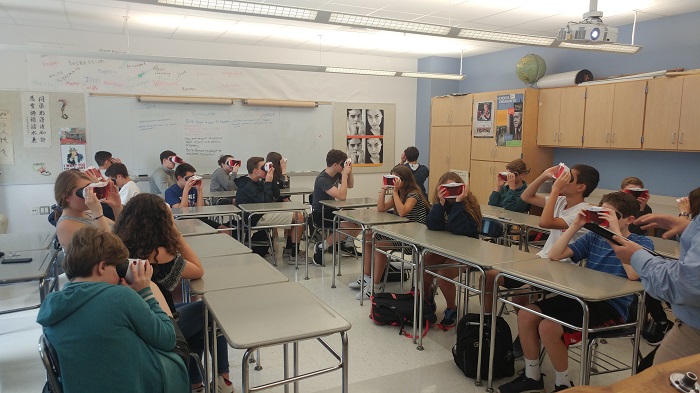
NHS Experiences ‘One Day’ Author Panel
By Laura Drinan
Hometown Weekly Reporter
Reprinted from the Hometown Weekly, February 8, 2018
Have you ever finished a book that just left you so astounded and inspired to write your own novel?
It has certainly happened to some of the students at Needham High School.
For their half-day schedule on January 31, Needham High students participated in the “One Day” experience, with this year’s theme revolving around developing authentic characters. Who would have been better to ask about authentic characters than three accomplished authors from eastern Massachusetts? The students selected workshops that would be most beneficial to their growth as writers for the school-wide event. To advise the students by sharing their personal writing experiences, local authors Diana Renn, Marjan Kamali, and Tara Sullivan served on a panel in the library’s media center.
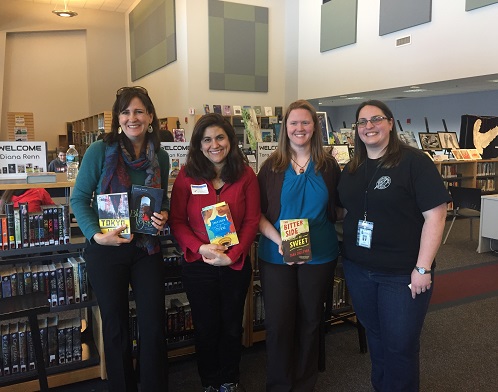
NEF Receives $50,000 Gift from Middlesex Savings Bank
NEF announces they received an unexpected $50,000 donation from Middlesex Savings Bank. The gift was part of a $1.2M donation that Middlesex Savings is making to further education in the communities they serve. “Middlesex Savings Bank has great respect for the education foundations in our community,” said Michael McAuliffe, President and CEO of Middlesex Savings Bank. “They work hard to support projects and programs that foster learning and creativity. We hope these donations will make their jobs easier this year and are excited to see their existing academic programs flourish or new ones come to life.”
See coverage in the Needham Times.
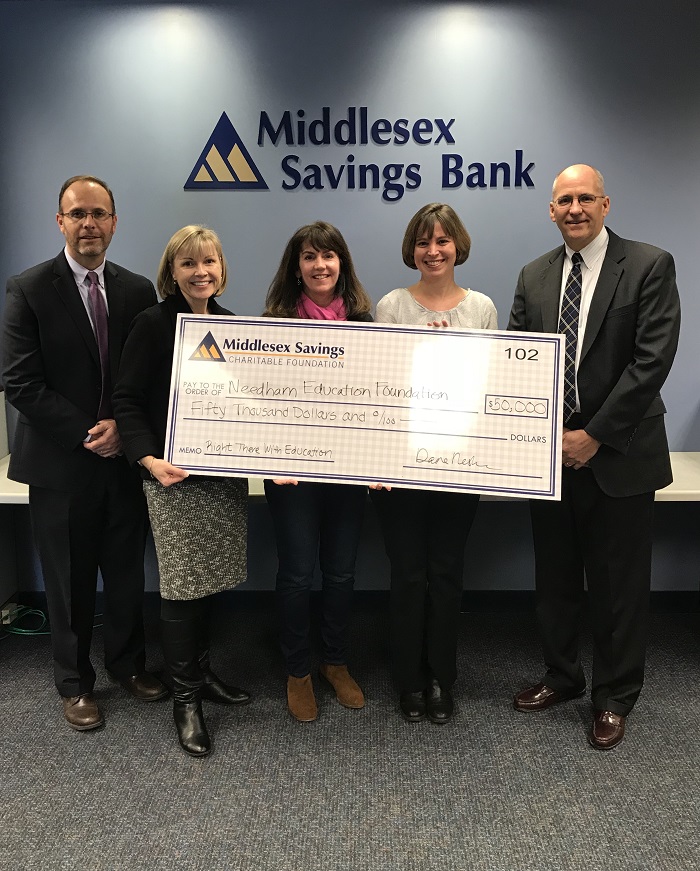
Spheros Bring Excitement to Learning
Last Spring, the Technology Integration Specialists at each elementary school collaborated on a grant to bring Spheros to the elementary schools and were awarded $10,000 from the NEF. What exactly are Spheros? They are robotic balls, about four inches in diameter, that can be programmed to do cool things using an iPad or Chromebook. The visual, block-based program makes learning the basic principles of programming approachable and fun for kids. Among other tricks, Spheros can change colors, run a circuit, and keep beat with a song.
The Tech Specialists have collaborated on introductory lessons that have allowed kids and teachers to become acquainted with these little robots. Using the Draw tool, Drive tool, and some simple programming of shapes, kids have: drawn shapes by hand on screen for the Sphero to repeat; used markers, large easel paper, and a see-through plastic cup to drive Spheros and create scribble art; grades 3-5 programmed Spheros to make spirals, figure 8s and other shapes; students in 4th grade “drove” their Spheros along a story map during Media.
As the children get more adept at using the Spheros, the tricks and programming can become more advanced. For example, they’ll be able to show their knowledge of geometry by programming angles to draw specific 2-D shapes. They will also be able to program the Spheros to solve more complicated mathematical questions, for example, measuring how speed and time will affect distance.
Kara Shea, a 3rd grade teacher at Hillside, says her class absolutely loves learning with the Spheros, and that they are an excellent tool for hands-on, project-based learning. Maria DeCicco, Tech Specialist at Hillside, said the Spheros have created a lot of excitement in classes across all grade levels. They have been such a success, says DeCicco, that she knows of three students who put Spheros on their holiday wish list. As one 3rd grader said, “They are really fun. They are the coolest thing in my life!”
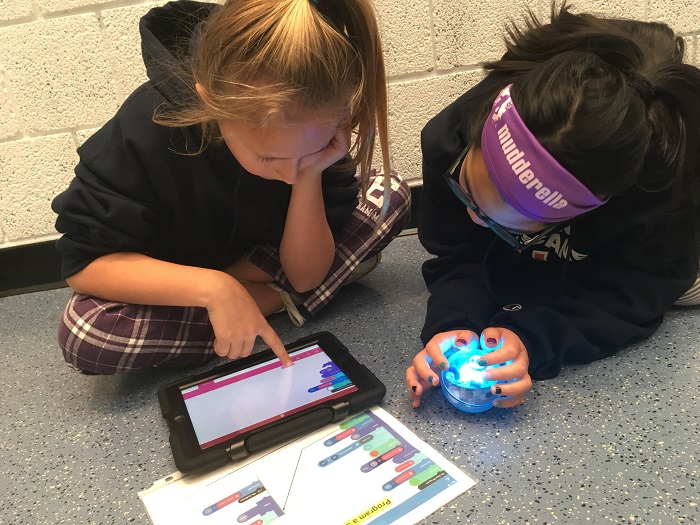
NEF Awards $35,664 in Fall Grants
The Needham Education Foundation (NEF) announced the recipients of 16 grants totaling $35,664 in the fall small grants cycle at the Needham School Committee meeting last night. Awarded grants include: playaways and digital magazines for the high school library, a giant floor map for Pollard, ukuleles for the Eliot School, an author panel at the high school, and a visit from two Lost Boys of Sudan at Newman. Other grants awarded:
- Lighting equipment for the performing arts departments at Needham High School, Pollard and High Rock, so that students will learn to operate lights and sound for all NPS performances.
- A collaboration between Pollard and the Needham Community Farm to fund a new STRETCH class and club where students will learn about food justice and gardening.
- Dialectical behavior stress management skill training for teachers at Pollard so that students will learn lasting skills for stress management. A parent information session will also be offered.
- Breakout EDU Kits for the elementary schools and High Rock, which offer a fun, creative way to develop team-building skills, critical thinking skills and can span all subjects and topics. Students work collaboratively to solve a series of problems to open locked boxes.
- A visit to each elementary school from Eine Kleine Konsort, a professional recorder quartet comprised of veteran music educators.
Author Jerry Pallotta Visits Hillside
Hillside kindergarten and first grade students could not contain their giggles in response to Jerry Pallotta’s audiovisual antics on a recent Thursday morning. Pallotta is a former Needham native and the author of the Who Would Win? series along with multiple alphabet and math themed books. He was invited to Hillside to make three presentations explaining the steps that go into writing non-fiction books and showing how much fun writing and reading non-fiction can be.
Pallotta’s day-long visit was funded by a grant from the NEF’s Spring 2017 Small Grants Cycle. Hillside parent Seema Meloni authored the grant with the support of school-based partners Liz Hitron, Hillside librarian, and Sena Hsu, 4th grade teacher. Their application pointed to recent research and changing Common Core standards that require elementary teachers to increase the amount of reading time that is focused on non-fiction texts to 50%. “It’s often challenging to find ways to excite students to focus on non-fiction texts,” Meloni wrote. This visit was envisioned to be a creative and innovative way to spark children’s interests and encourage them to spend more of their independent reading time on non-fiction materials.
“I loved that he showed students his writing drafts and work-in-progress to show that writing truly is a process,” Sena Hsu pointed out, “He also shared some titles and ideas of books that never got published. It’s so important for kids to realize that even adults try and don’t always succeed and that’s ok. That’s how we learn and grow. What great Growth Mindset moments!”
Jacob Peters, 4th grader, summed up the visit: “Jerry Palotta is a very bright and kind person. He is an awesome author, too.”
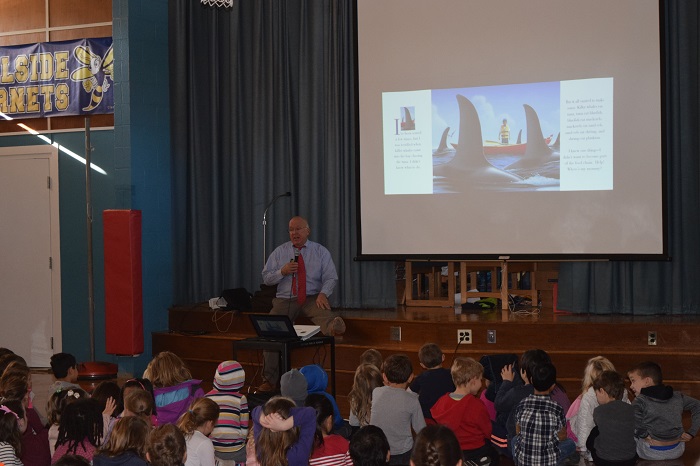
Race to Nowhere: Film and Panel Discussion
Nearly 200 parents, teachers, administrators and community members filled the Pollard auditorium on October 19th to watch a screening of Race to Nowhere. The film, which was funded by a NEF grant, examines the culture of over-scheduling, over-testing and over-pressuring children. It “reveals an education system in which cheating has become commonplace; students have become disengaged; stress-related illness, depression and burnout are rampant; and young people arrive at college and the workplace unprepared and uninspired.”
The film was introduced by Tamatha Bibbo, Principal at Pollard Middle School, who said that the new STRETCH Block is one way Pollard is trying to take some pressure off of kids during the school day. STRETCH classes meet for 6 weeks, twice a week, for 30 minutes each, and offer students the opportunity to “stretch their skills and competencies through enriching activities, and explore interests without the pressure of homework or assessments.”
After the film concluded, a panel of four educators took questions. Parents were curious what the Needham Public Schools are doing to address the issues presented in the film—especially considering it was released in 2010. Michael Goodin, Founder of the Rivers and Revolutions Program at Concord-Carlisle High School, reminded the audience that “seven years is just a blip in the education system. It’s going to take years and years to change things.” Lisa Fiore, Professor of Developmental and Educational Psychology at Lesley University, recommended that parents attend school committee meetings to let their concerns be known.
All agreed that professional development is one key to exploring the topics that were addressed in the film. Aaron Sicotte, Principal of Needham High School, said that the longer school day is enabling teachers at the high school to meet once a week.
The amount of homework was also a topic of conversation. Sicotte commented that homework is something “we’re continuing to talk about.” Parents and teachers need to consider, however, “If a child is taking six hours on homework, have we chosen the right class for him or her?”
Jimmy Odierna, Interdisciplinary Learning Specialist and Co-Founder of the Greater Boston Project at Needham High School, commented that the district is starting to focus more on growth mindset. Teachers of the Greater Boston Project have changed the rubric to include assessments on how much a student has grown and how a student has rebounded after dealing with a setback.
The pressure to achieve and attend the top colleges was a recurring theme throughout the movie. Odierna said “We, as a community, still push the top schools … Do kids need to go to an Ivy League school to be successful? Of course not.” He also stressed that NPS are focusing more on social-emotional learning and project-based learning. Sicotte added, “It’s a hard balance because we have a state and nation that has high expectations, and the town of Needham pays a lot of attention to MCAS and SAT scores.” “How do we make sure we have healthy kids?” he asked. “As parents, it’s important to know your kids and find a path that makes sense for them, and that path won’t necessarily be the one your neighbors are following.”
